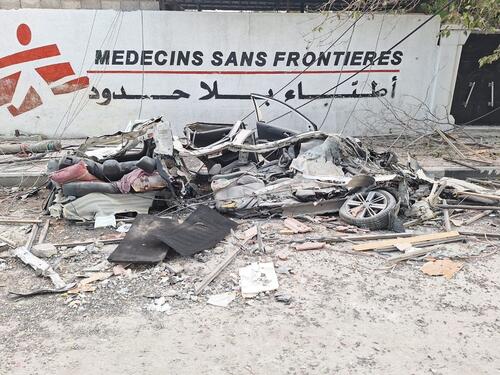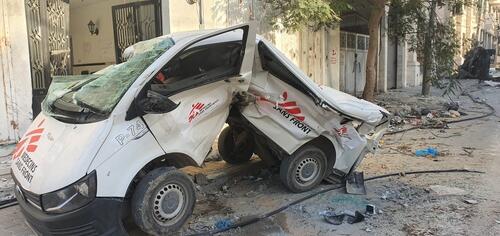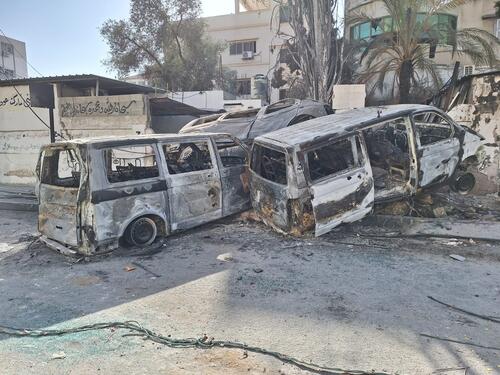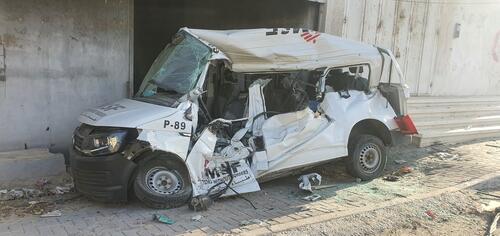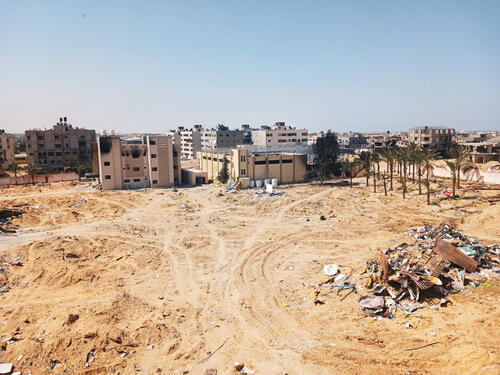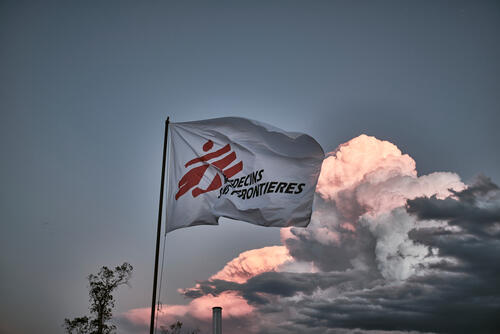On 18 November 2023, a Médecins Sans Frontières (MSF) evacuation convoy came under fire in Gaza City, Palestine. Two people were killed in what immediately appeared as a deliberate attack against clearly identified MSF cars. Both people killed were family members of MSF staff; one was also a volunteer supporting MSF medical teams at Al-Shifa hospital. Two weeks later, after collecting the testimonies of MSF staff present that day in the convoy, MSF considers that all elements point to the responsibility of the Israeli army for this attack.
MSF has also collected testimonies of the destruction of five MSF vehicles and the severe damage caused to the MSF clinic in Gaza City, all clearly identified by the MSF logo, on 20 November, which can also be attributed to the intervention of an Israeli bulldozer and a heavy military vehicle. These vehicles were potential evidence, in case of an independent investigation on the attack on the MSF convoy.
Shots were aimed at the MSF facilities where these colleagues were sheltering, leaving bullet holes in the interior walls. On 24 November, MSF staff also witnessed the destruction of a minibus, also clearly identified by the MSF logo, by an Israeli tank. This minibus had been sent by the MSF team in south Gaza, following the destruction of the vehicles a few days before, to facilitate the evacuation of colleagues in the north.
MSF condemns again in the strongest terms the attack on our convoy and extends again our condolences to the families of the victims. MSF requested a formal explanation for this attack from the Israeli authorities and calls for an independent investigation to establish the facts and the responsibilities.
The staff and family members who went through this ordeal had been trapped in MSF facilities amid heavy fighting, with no electricity, and limited access to food and water, for almost two weeks, before they were able to evacuate to the south of the Gaza Strip on 24 November. These are their words, recorded between 26 and 29 November.
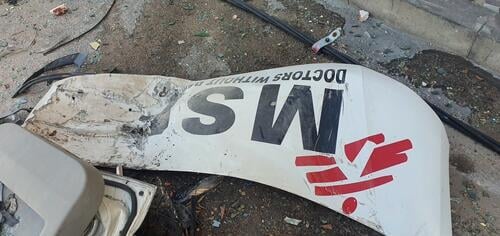
18 November: an MSF volunteer and another staff’s family member killed by the Israeli forces
MSF staff member 1:
“On 18 November, the MSF office in Jerusalem obtained the authorisation for us to evacuate from the Gaza office, clinic and guesthouse to the south of the Gaza Strip. We collected our things, and everyone got in the cars, ready to go south along Salah Al-Din Street.”
MSF staff member 2:
“We arrived at the checkpoint of Salah Al-Din Street. I was in the fourth van. There were Israeli troops standing there and they asked us to move back to where we came from, because there was no authorisation.”
On 18 November, an MSF convoy of five cars, all clearly identified by MSF logos, left the MSF premises (guesthouse, office, and outpatient clinic), headed to southern Gaza to reach a safer place. Since 11 November, our staff and their families had been trapped by ongoing fighting around them, and since then, MSF had repeatedly called to safely evacuate them.
MSF had informed both parties to the conflict of this evacuation movement. The convoy followed the itinerary indicated by the Israeli army and reached Salah Al-Din Street, along with other civilians trying to leave the area.
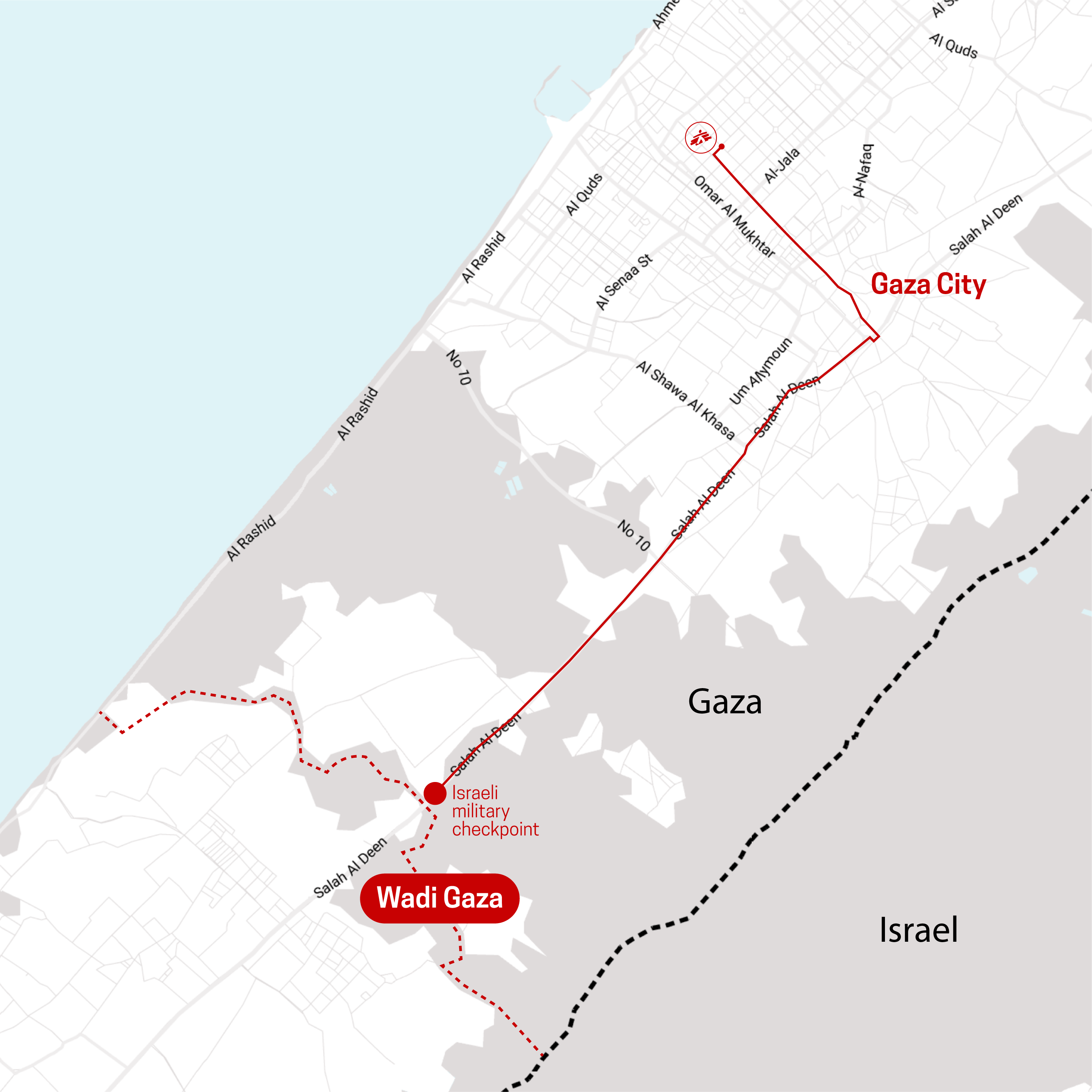
The convoy reached the last checkpoint near Wadi Gaza, which was overcrowded at that time due to extensive screening of Palestinians by Israeli forces. Despite the prior authorisation from the Israeli authorities, the convoy wasn’t allowed to cross the checkpoint and was left waiting for hours. Shots were later heard by our staff, who out of fear decided to head back to the MSF premises, around seven kilometres north of the checkpoint.
MSF staff member 1:
“We stayed there around three hours; it was getting dark. Hundreds of people were waiting and some of them decided to head back north because the checkpoint would not let them through.
My colleagues in the cars said: ‘Let’s go back, our only shelter is the MSF Gaza office’.
We contacted Paul [an MSF colleague in Jerusalem] to inform him that we would head back because we were not allowed to pass the checkpoint. He said he would ask for the authorisation for us to go back.”
On their way back, between 3:30 pm and 4:00 pm local time, the convoy was attacked in Al-Wahida Street, near the junction of Said Al-A’as Street, near the MSF office. Two of the MSF cars were deliberately hit, killing a nurse who volunteered with MSF teams and injuring the family member of another, who later died from his wound.
MSF staff member 2:
“When we arrived in Al-Wahida Street, which is close to our office, guesthouse and clinic, I saw tanks and snipers at the top of the buildings. I was terrified when I saw that the snipers and the tanks were pointing their weapons at us, especially at the fourth and the fifth van [in the convoy].
They started opening fire on us, and when a bullet grazed my forehead, I got a superficial injury. The bullet hit my colleague Alaa in the head; he sat next to me. He received a critical head injury and started bleeding massively.
His head fell on the steering wheel, and I immediately retook control of the steering to move to the right of the street.”
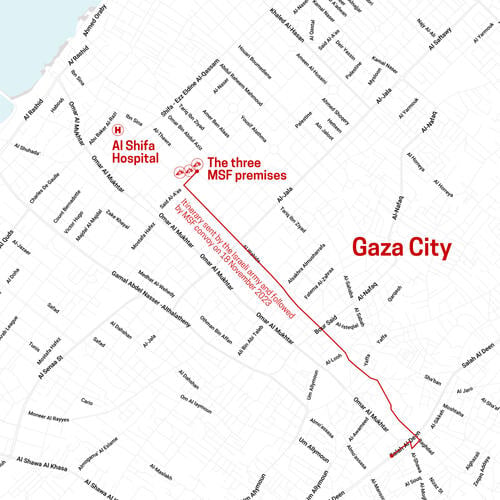
MSF staff member 2:
“We arrived at the clinic, and we started to try to give Alaa life support, trying to stop the bleeding from his head. We couldn't do anything. He died while we were trying to (support him and to) save his life.”
MSF staff member 1:
“I stopped at the entrance of the clinic and waited for the last two vans to come; people were saying that one of us had been killed and his name was Alaa Al-Shawa.”
MSF staff member 2:
“We stood up, just shocked by his death and all that had happened to us. I was speechless and just not able to think. My kids were crying, and people were discussing how to bury our colleague.
And we had another person injured in the abdomen.”
MSF staff member 1:
“I decided to take shelter in the guesthouse with about 50 other people, as it felt safer than the clinic. [My colleague] Mohammad, his family and other families decided to stay in the clinic.
The cars were parked outside the clinic. Most of the people’s belongings stayed in the cars.
We managed to stay in touch with the people in the clinic. They told us they had buried Alaa Al-Shawa.”
20 November: five MSF vehicles destroyed by the Israeli forces
MSF staff member 2:
“Two days later, after the convoy attack, a bulldozer clearing the way for Israeli tanks came and damaged our cars, and threw them away from the right and the left side of the street.
I was witnessing this from the window from upstairs in Gaza clinic.”
MSF staff member 3:
“Out of the upstairs window, we saw an Israeli bulldozer, and a tank next to it. And behind it there were four or five vehicles, tanks and tracked vehicles. They were moving and firing, and the shooting was heavy.”
MSF staff member 1:
“We heard a strange sound, like cars being crushed, and gunshots. I looked through the window and I saw.
The cars had been pushed to the side and a fire had started.
Once the tanks moved a little further away, I started filming, though I was scared. It was a terrible, frightening sight.
My colleagues were in the clinic, and I was afraid the fire could reach them. The fire crept up along the trees [by the clinic]. The electrical wiring also caught fire; it was a horrible scene.”
MSF staff member 2:
“When [the bulldozer] pushed aside the cars, the western wall of the clinic fell apart. Then the tank came and opened fire towards the MSF cars and vans.
The MSF vans caught fire.
I was in the clinic; the fire and the smoke came inside. We stood there, thinking about how to stop the fire. So, we moved the children and the women through the back doors to the other building, where MSF has the physiotherapy department.”
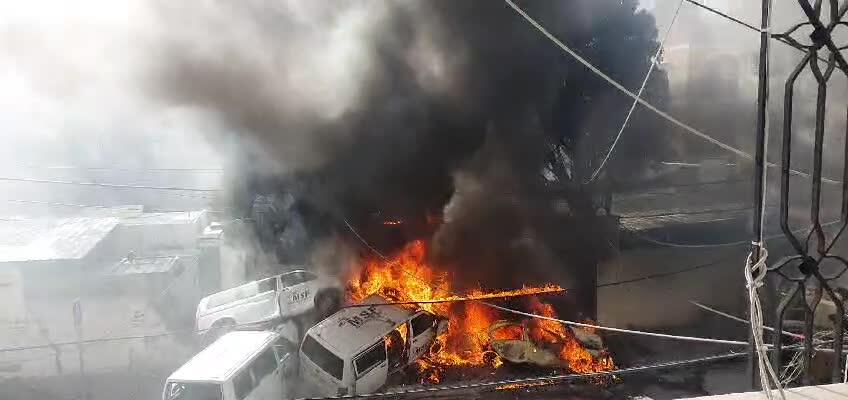
MSF convoy attacked in Gaza
MSF staff member 2:
“We closed the doors, the clinic doors, and got inside. So, the tanks were in the street outside the clinic; they kept coming back and forth for four days.”
MSF staff member 1:
“The morning of the next day, at around 10 am, we started shouting, to check on [our colleagues], to know if they were alive or dead... I did not know.
Thank goodness, someone replied and said they were unhurt, and that they were also worried about us.”
24 November: more MSF vehicles destroyed
MSF staff member 2:
“We used to take power and electricity from the guesthouse generators. But after this fire, the lines were all damaged and we had no power for three days. During these three days and before the truce, we had no electricity, no food and no clean water at all.
The first day of the truce at 4.30 am, an Israeli tank destroyed the MSF minibus and cars that had been sent to us [from the south of Gaza] for our evacuation too.”
As the only vehicles available to the staff and their family members had been destroyed, our teams based in the south of the Gaza Strip sent more vehicles to Gaza City to attempt another evacuation. However, they were also hit by bullets while approaching the MSF clinic and the movement was cancelled.
Later, they too were destroyed by the Israeli forces – in the early hours of 24 November. Eventually, our colleagues and their families were able to reach the south once the truce came into effect on the morning of 24 November, thanks to the vehicles of other civilians evacuating.
MSF has requested a formal explanation for this attack from the Israeli authorities and calls for an independent investigation to establish the facts and the responsibilities.
We extend again our deepest condolences to the families of the victims.



